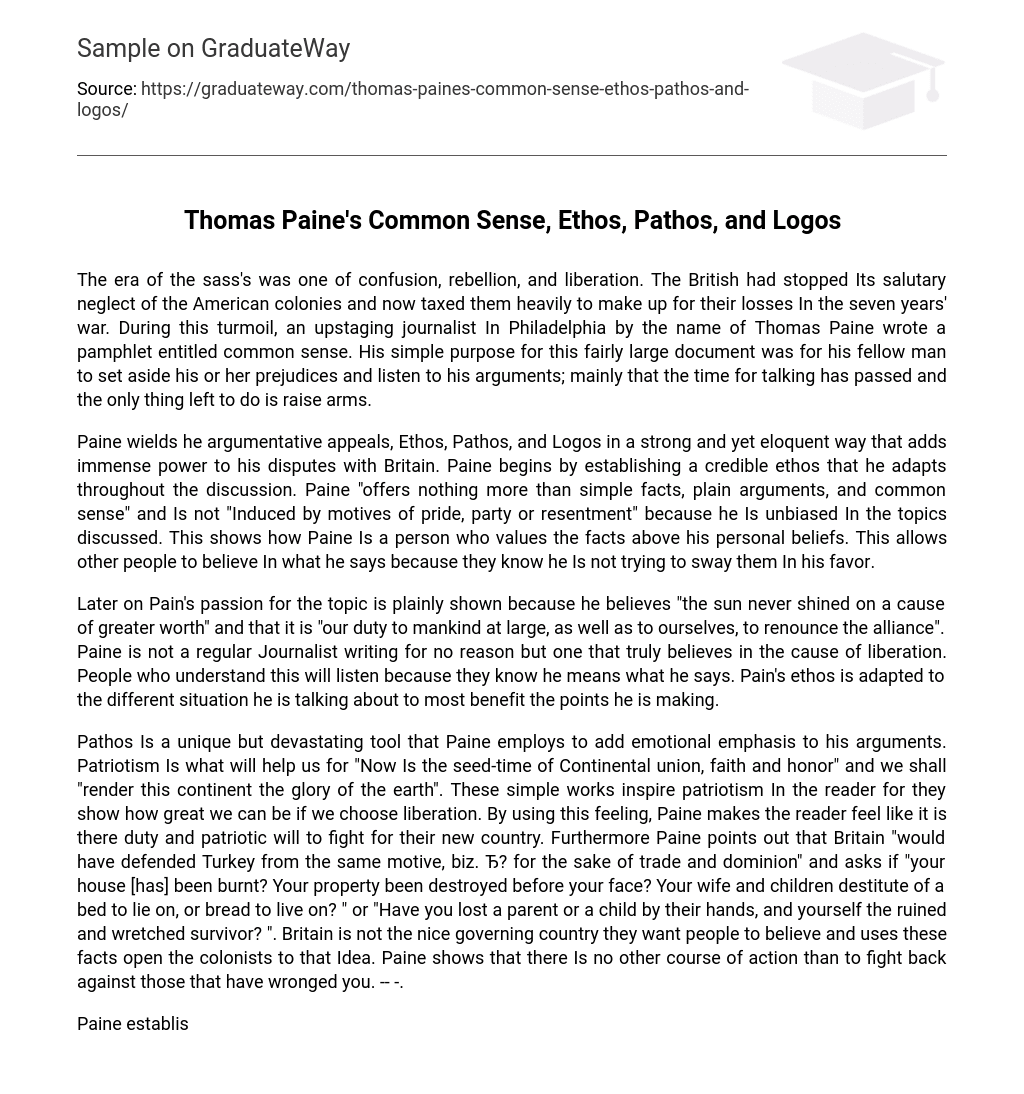The era of the sass’s was one of confusion, rebellion, and liberation. The British had stopped Its salutary neglect of the American colonies and now taxed them heavily to make up for their losses In the seven years’ war. During this turmoil, an upstaging journalist In Philadelphia by the name of Thomas Paine wrote a pamphlet entitled common sense. His simple purpose for this fairly large document was for his fellow man to set aside his or her prejudices and listen to his arguments; mainly that the time for talking has passed and the only thing left to do is raise arms.
Paine wields he argumentative appeals, Ethos, Pathos, and Logos in a strong and yet eloquent way that adds immense power to his disputes with Britain. Paine begins by establishing a credible ethos that he adapts throughout the discussion. Paine “offers nothing more than simple facts, plain arguments, and common sense” and Is not “Induced by motives of pride, party or resentment” because he Is unbiased In the topics discussed. This shows how Paine Is a person who values the facts above his personal beliefs. This allows other people to believe In what he says because they know he Is not trying to sway them In his favor.
Later on Pain’s passion for the topic is plainly shown because he believes “the sun never shined on a cause of greater worth” and that it is “our duty to mankind at large, as well as to ourselves, to renounce the alliance”. Paine is not a regular Journalist writing for no reason but one that truly believes in the cause of liberation. People who understand this will listen because they know he means what he says. Pain’s ethos is adapted to the different situation he is talking about to most benefit the points he is making.
Pathos Is a unique but devastating tool that Paine employs to add emotional emphasis to his arguments. Patriotism Is what will help us for “Now Is the seed-time of Continental union, faith and honor” and we shall “render this continent the glory of the earth”. These simple works inspire patriotism In the reader for they show how great we can be if we choose liberation. By using this feeling, Paine makes the reader feel like it is there duty and patriotic will to fight for their new country. Furthermore Paine points out that Britain “would have defended Turkey from the same motive, biz. Ђ? for the sake of trade and dominion” and asks if “your house [has] been burnt? Your property been destroyed before your face? Your wife and children destitute of a bed to lie on, or bread to live on? ” or “Have you lost a parent or a child by their hands, and yourself the ruined and wretched survivor? “. Britain is not the nice governing country they want people to believe and uses these facts open the colonists to that Idea. Paine shows that there Is no other course of action than to fight back against those that have wronged you. — -.
Paine establishes a variety of emotions via pathos that help the reader to understand why he Is making these points. Sawbones to his entire pamphlet, you should do something because it is logical to do it. An overriding idea in this time is that the colonies need Britain because we have needed them in the past. Paine simply rebuts this by pointing out that “we may as well assert that because a child has thrived upon milk, that it is never to have meat” and continues on with “that the first twenty years of our lives is to become a precedent for the next twenty’.
It doesn’t make sense to say that Just because it worked in the past, it will also work in the future. Another idea presented is that Britain protects the colonies from enemies in war. However Paine reminds colonist that “we should be at peace with France and Spain” and “France and Spain never were, nor perhaps ever will be, our enemies as Americans, but as our being the subjects of Great Britain. ” If the colonies were not part of Britain, then they would not be in any wars or in any danger from attack. – Logos is heavily used in Thomas Pain’s pamphlet because it is a major factor in his arguments.
Thomas Paine used Ethos, Pathos, and Logos very adamantly to further his arguments and help the reader understand where he was coming from and what he wished to be accomplished. He wanted colonist to fight against the British and unshackle themselves from its repressive monarchy. He told of how the British is not a help, but in fact a burden that leads to war, death, and destruction. The British have put Boston in a terrible position for simple protests against unfair taxation of tee. In addition they massacred many innocent colonists in Lexington Just to put a stop to two men that they had a disagreement with.





